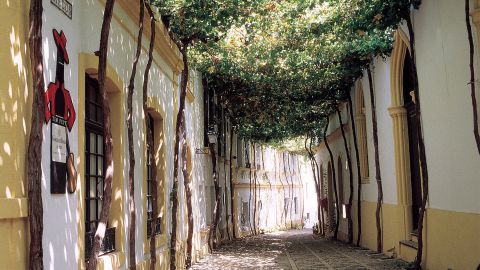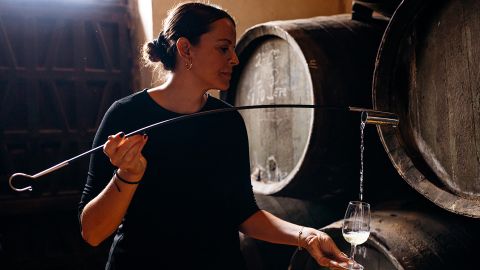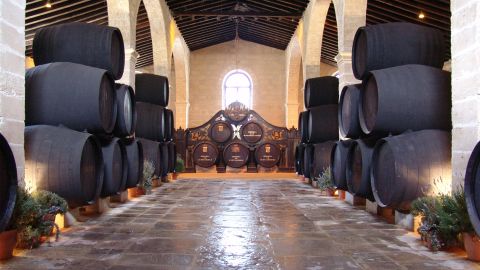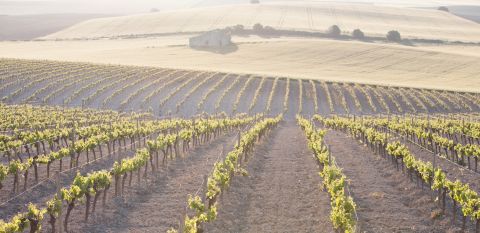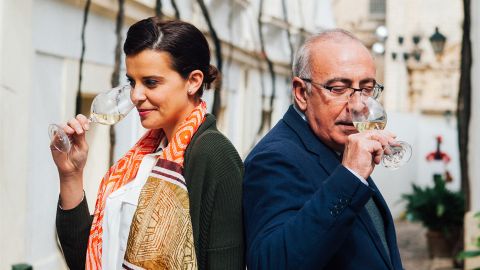Silvia Flores was born in Jerez and is the third generation of her family working at González Byass. Her grandfather Miguel Flores was the technical director for more than 50 years and her father, Antonio Flores, is the current winemaker and master blender. Six years ago, Silvia joined the technical team of González Byass where she is working as assistant winemaker. She is due to take over from her father as winemaker when he decides he would like to retire – which is not yet! Beyond her work at González Byass, she is a sommelier with experience in various Michelin-starred restaurants in Spain. Flores is also an official sherry educator and is working on completing her WSET Diploma.
Victoria Did you choose wine or were you forced into it?
Sherry was always a part of my life. My father was always keen for me to be involved and try it, even if I was maybe too young! In Jerez, it’s very usual for young people, when they turn 18, to work in the vineyards during the harvest to make some money and that’s what I did. But I had no inclination to work within the wine industry. However, as I got older, I would sit in my dad’s office waiting for him to finish work and stare at all the bottles. Sometimes I would even try some of the bottles as I was just fascinated by them.
My personal interest in wine began during my time working in a renowned restaurant in Barcelona. I had the opportunity to taste a variety of wines because of the sommelier that worked there, including a memorable experience with a fine champagne. That moment was pivotal for me. Before this I had gone to university to study art history, then changed my studies to business and hospitality. Subsequently, I moved into the hospitality industry, working in various roles and specialising in sherry, eventually becoming a wine buyer for a major retailer in Spain. However, a surprising opportunity came up for me when the human resources director at González Byass contacted me, inviting me to join the winery.
What was your reaction?
It was a decision I hadn’t anticipated. My father, understanding the magnitude of the choice, presented it to me without pressure. He recognised the contentment I had in my existing role but reminded me that it was a unique opportunity to work together and learn from him. Ultimately, the positives outweighed the negatives and I decided to take the job, realising that this was a unique opportunity and a gift. I’m grateful for the experience of working alongside my father as it has added an emotional dimension to my professional journey.
Working with family can be both rewarding and challenging. How has the dynamic been for you?
Initially, it was quite overwhelming. I found it difficult because I had no experience in wine production at that time, so I was just trying to learn as much as possible and be an information sponge. The weight of the responsibility, coupled with the fact that my father is not only my dad but also my boss, also posed challenges. Learning to balance our roles and expectations took time. It’s an ongoing process, and we’ve had to navigate the complexities of family and business. However, it’s important to note that there are many more positives than negatives with working with family and no one wants to teach you more than your father does!
How was it at the beginning working for González Byass?
I started in 2017 but I’d been a sherry educator since 2012. When I joined the winery, I made sure to do training in all sectors of the business including the laboratories, bottling, harvesting and even marketing as these are all part of my role now. Understanding how they function at a fundamental level was important to me. When I started, my father gave me two things: a special tool, a venenciador, that takes samples from casks, and a book written by founder and family member Manuel Maria González Angel called Jerez-Xerez-Scheris. We treat it like our bible because it contains all the historical themes of sherry and the technical tools we may need. To this day, I try and keep updated in the sherry world by reading articles and looking out for new laws as the industry is changing constantly. I make sure to learn from colleagues when I can and try wines not just from our own production to see what more we can do.
How has your diverse experience influenced your approach to winemaking?
Working in various aspects of the wine industry has provided me with a holistic perspective. This, in turn, has enriched my winemaking approach. My father worked his whole life in sherry and never strayed into other business areas. This means he has an incredibly in-depth knowledge about sherry but not as much of an understanding about consumer demand or how bigger companies trade wine. These are things I gained from my experience before I came into the business. It enabled me to enter González Byass with a strong vision.
What are your ambitions for González Byass in the next 5 to 10 years?
Our primary ambition is to preserve and maintain the legacy of our wines, a responsibility passed down through generations. I also aspire to make sherry more accessible to younger generations. Complexity shouldn’t be intimidating. By presenting sherry in a simpler manner, recommending pairings, and emphasising quality for value, we hope to demystify sherry for newcomers. It’s about providing an opportunity to taste these unique wines without the barrier of complexity or high costs.
I want the younger generation to see sherry as a unique and enriching experience. Beyond its complexity, sherry offers a journey into history, tradition and the art of winemaking. It’s a treasure that requires time and care, and by embracing it, they can discover a world of flavours and stories.
What’s planned for the future?
One of our ongoing projects involves experimenting with different grape varieties. We are exploring their behaviour in various soils and vineyards. Recently, we initiated a project to grow and plant 30 hectares of organic Palomino Fino grapes, specifically for organic fino sherry. These plantings began around five years ago, and we are looking forward to the results.
We are also currently working on an expansion project for our historical bottle cellar. This space holds bottles dating back to 1840. We’re creating a new area for special tastings and offering customers the opportunity to purchase and store a bottle in our cellar. Hopefully this will happen in the next year.
Additionally, we’ve initiated a unique project collaborating with renowned restaurants. They select specific vintages, and we work together to classify and preserve those wines. For example, we work with a famous Michelin-starred restaurant in Spain and have offered them the 1986 vintage because that was the year the restaurant was founded. That’s something you wouldn’t be able to do elsewhere. We believe that we have to show people the treasure that we have.
What are you most looking forward to for González Byass?
Right now, we are preparing the new release of the Las Palmas range. This project involves inviting wine professionals to help select the soleras for the Las Palmas wine and we’ve had great responses so far! Jancis Robinson MW was the first to be involved in the project and selection back in 2011.
What would you say is the most important thing that you’ve learned from your father? And what do you think is the most important thing he’s learned from you?
Patience. He always says, ‘Be patient, be patient, Silvia. Be patient because it will happen. Keep calm.’ This is a very big lesson. You need this patience and calmness to have a good and long career, to learn, and to present yourself well to people. Time gives you all that you need. I think my father has learnt to be brave from me, to face challenges.
What’s your favourite style of sherry?
Amontillado. I love the complexity it has with both biological ageing and the beginning of oxidative ageing, and the power of the American oak.
What are your favourite wine regions or styles other than sherry?
I love the Champagne region because when I studied sparkling wines in the WSET Diploma, I found lots in common with sherry production, including the type of soil, the climate and how it adapts, but the results are obviously very different. I think that’s why I like it.
I love also volcanic regions like Lanzarote, Etna and Santorini. I know how complicated it is to make wines in these places, to try to get the vine safely through such hostile, windy conditions, to bear fruit. The resulting wines are amazing and very different.
If you were to look back to 2017 when you first joined González Byass, what advice would you give to yourself?
It would be to be patient and not feel pressured, to enjoy the moment, to keep memories, and to learn. Learn as much as I can, not just from my father, but from the older people that work in the bodega. These older people know so much … the location of certain casks, the stage of their development, the best casks. Their knowledge is not in books, and it’s crucial to learn from their experience.
You can read the entire interview at Bordeaux Index. Our members can also access more than 130 tasting notes on González Byass wines in our database.


